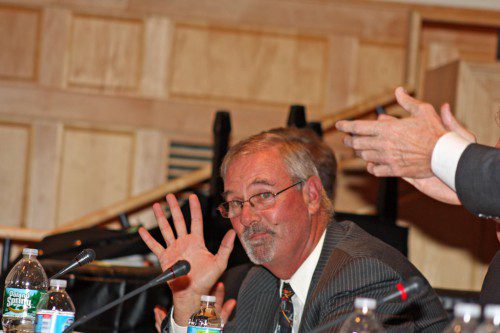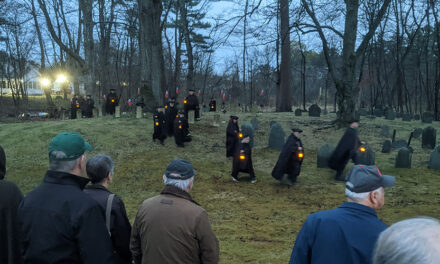By MAUREEN DOHERTY

RETIRING Town Administrator Bill Gustus acknowledges the Town Meeting voters who offered him a standing ovation Oct. 20. It was his last Town Meeting as he is retiring Jan. 1 after 12 years at the helm. (Maureen Doherty Photo)
LYNNFIELD — Voters at last week’s session of fall Town Meeting took action on over a dozen routine articles in addition to the votes on four failed citizens’ petitions and to indefinitely postpone the sale of Centre Farm after no bids were received from buyers.
Prior to opening the floor up for discussion on the articles, Town Moderator Arthur Bourque requested a moment of silence in memory of Betty J. Hayter, 90, who died Oct. 19. In addition to serving her country as a WAVE during WWII, Mrs. Hayter was assistant town clerk for 20 years, served as chairwoman of Lynnfield’s Council on Aging for many years and was active in the Centre Congregational Church and other community organizations such as the Historical Society.
Bourque praised Hayter for her volunteerism and activism. “She was at every veterans event in her WAVE uniform,” Bourque recalled, adding she was “a very big activist here in the community, making this town a much better place because she was here.”
Article 1 passed unanimously to pay $1,902.82 in overdue bills that arrived after the close of the fiscal year in June. It was paid from free cash.
Article 2 passed unanimously to balance the FY’15 budget. Four actions were rolled into one motion to raise and appropriate $90,478.67, appropriate $10,000 from General Fund free cash, appropriate $95,000 from Golf Enterprise Fund free cash and transfer $38,547.94 between existing FY’15 appropriation accounts.
These actions will enable the town to complete golf capital design and site work at King Rail Golf Course ($95,000); purchase a used fire chase vehicle ($10,000) to replace an SUV that had 258,000 miles on it; to pay long-term interest on the field project ($67,928.67); to cover a $6,000 fee for general liability insurance and to pay $11,550 to cover the cost of the Town Administrator search contract.
Also, the transfers free up $25,000 to cover the potential overlap in the Town Administrator salary during the transition between T.A. Bill Gustus and his successor, including the buy back of any accrued vacation days to which he may be entitled under his contract plus the unknown factor of his successor’s salary.
There was also a 1:1 transfer of $18,547.94 to cover the town’s share of the salaries of the electrical and plumbing inspectors. The town now pays Wakefield for these professional services which were originally appropriated as salary in the April 2014 town warrant.
Article 3 also passed unanimously enabling the town to transfer funds received as insurance recoveries from two covered losses in order to make the appropriate repairs. The first, a sum of $12,416.11, was due for repairs to the DPW garage and repair or replacement of DPW equipment. The second was $24,204.87 to make repairs to the King Rail Golf Course and repair or replace equipment or vehicles at the course that were damaged by vandals.
Article 4 passed on a voice vote to raise and appropriate $100,000 for the Other Post Employment Benefits Liability Trust Fund (OPED). This is a trust fund set aside to pay for the future health benefits of the town’s current and future retirees, of which the town’s unfunded liability is pegged at $52 million. The fund was established last year with $100,000.
T.A. Bill Gustus recommends that the town follow through next year with a minimum $50,000 appropriation, which would then give the town the minimum $250,000 the state requires to invest in its funds. Gustus said doing so would give the town access to a broader range of investment options and potentially a greater return on the investment.
Gustus explained that this liability is required to be shown on the town’s balance sheets by the Government Accounting Standards Board. “This is an attempt to get in front of it,” he said of the “staggering” annual contribution the state recommends the town set aside of $3.5M. Contributions to the OPED trust are “irrevocable” Gustus said.
Finance Committee Chairman Jack Dahlstedt said that in a vote that was not unanimous, his committee did not recommend passage of Article 4.
“Philosophically, the Finance Committee is very much in favor of setting aside these funds but feels it should be set aside in one of our separate reserve funds,” Dahlstedt said. The committee’s discussion “related to setting aside funds directly in a reserve account that is labeled for OPED and the potential for that account to be seized by the government in the future should a broader program be put in place to manage these (funds),” he said.
The Board of Selectmen recommended passage. The rating agencies look more favorably on a town’s financial condition when the funds are established in the irrevocable trust versus a separate reserve fund, Gustus said.
Article 10 passed to raise and appropriate $100,000 to pay for the repairs necessary to fix pre-existing drainage pipes at the high school that were discovered in disrepair during the construction of the new turf fields.
Selectman Phil Crawford said these repairs were unforeseen and had nothing to do with the fields project as the pipes serviced the school building, therefore fixing them was not part of the contingency fund for the fields project. Nevertheless, the town had no choice but to fix these pipes for the fields construction project to proceed.
Article 11 passed unanimously to authorize the selectmen to submit an application to the state Division of Conservation Services for a Parkland Acquisition Renovations for Communities (PARC) grant to redevelop Jordan Park. If approved when the grant winners are announced next month, the town will be eligible for at least 56 percent reimbursement of the $740,800 cost.
The motion was changed on the floor from “up to 56 percent” to “at least 56 percent” reimbursement. The motion also states that the expenditure is contingent upon receiving a grant; therefore if the grant is not received the town would not be obligated to proceed with the project.
Article 12 passed unanimously to close a loophole in the town’s zoning bylaw affecting the Planned Village Development District (PVDD) created under Ch. 40R at MarketStreet by adding to the list of expressly prohibited uses both adult uses and medical marijuana facilities.
Article 13 passed unanimously to amend the town’s zoning bylaw to specifically state the restriction: “An adult use may only be located within the Commercial District within the town.” Planning Board Chairman John Faria said, “If you do not want adult uses at MarketStreet you want to vote in favor of this amendment to the zoning bylaw.” It effectively limits the adult use district to “only one district behind Eastern Bank at Kimball Lane,” Faria said.
Article 14, sponsored by the Planning Board, was unanimously approved to revamp the wireless communications bylaw by eliminating the town’s Wireless Communication District and replacing it with a new section that applies town-wide. It is a special permit called “Siting of Radio Telecommunications Facilities” and includes additional requirements applicable to Personal Wireless Service Facilities (PWSF).
A voter asked if passage of this article meant that wireless facilities would be allowed in any district in town. Planning Board member Alan Dresios said yes, explaining that such limitations must be changed due to federal law.
“Unfortunately, you can’t limit where you have these districts, that is against the federal law. If a provider is missing an area of communications or coverage area … they can apply for a permit. If we say … we don’t allow it in that district, they just go to Boston, apply to the telecommunications board and get their permit, which means we are out of the loop completely. We can’t ask for camouflage, we can’t ask for contracts because the state takes control of it.”
Dresios added that this bylaw is a copy of one now in use in Westwood, which has already been approved by the AG’s office.
Article 15 allowed Pizzuti Way to be accepted as a public way unanimously.
Article 16 was approved unanimously to amend the town’s bylaw on solicitors and canvassers by adding four new sections. These changes define persons who are exempt, set requirements for registering vehicles used by solicitors within the town, prohibit such activity on any residential property which has displayed a sign prohibiting trespassing, solicitation or canvassing, and set parameters and fees for renewing canvassing licenses with the Chief of Police.
Individuals exempt from the bylaw include those conducting political, religious or non-profit activities as well as any officer or employee of the town, county, state or federal government on official business and route salespersons making periodic deliveries to established customers or who call upon prospective customers, including news carriers.
Article 17 was approved to amend the town’s general bylaws on dog licenses and fees. The existing section 17A was deleted and replaced with one that aligns it with MGL Ch. 140 section 137. Dog and kennel licenses are issued for the calendar year and must be obtained on or before March 1 or the owner is subjected to a fine. Applications to the Town Clerk must be accompanied by a rabies vaccination certificate.
Kennel licenses are issued in lieu of licensing dogs individually for those with multiple dogs and cannot be issued or renewed without an inspection and approval by the animal control officer and/or the Board of Health. It was pointed out by a voter that the bylaw lists three kennel sizes — four dogs or fewer, 5 to 10 dogs and 11 or more dogs — in all use categories, whether personal, commercial, charitable or veterinary but residents are not supposed to have more than four dogs.
Gustus said if an owner has four dogs the town has the option to charge them a kennel fee or individually. He added the adoption of the bylaw does not mean an individual can have more than four dogs “as a matter of right” because the owner would have to seek a special permit from the town to have five or more dogs.
The bylaw as printed in the warrant inadvertently omitted the fee for an unneutered male dog, which should have been $10, the same as the fee for unspayed females, a voter pointed out. The fee is $5 for neutered males or spayed females.
Article 18, a request by the Tree Committee to adopt a Scenic Road bylaw, was passed over.




